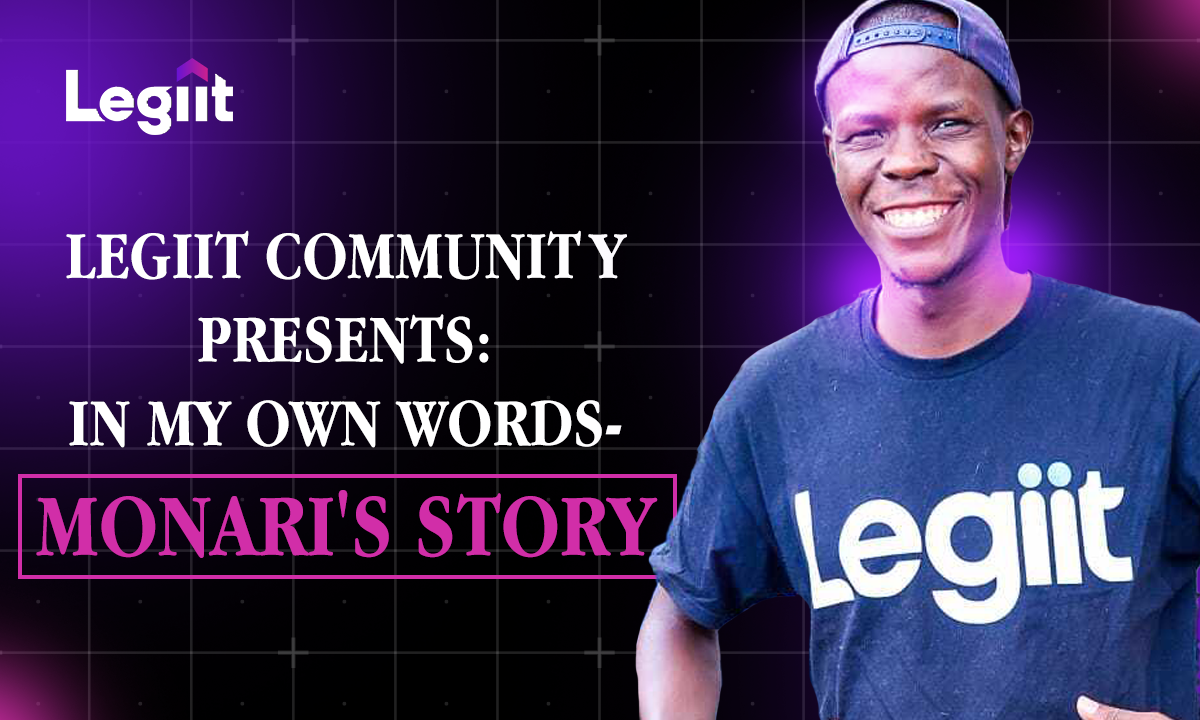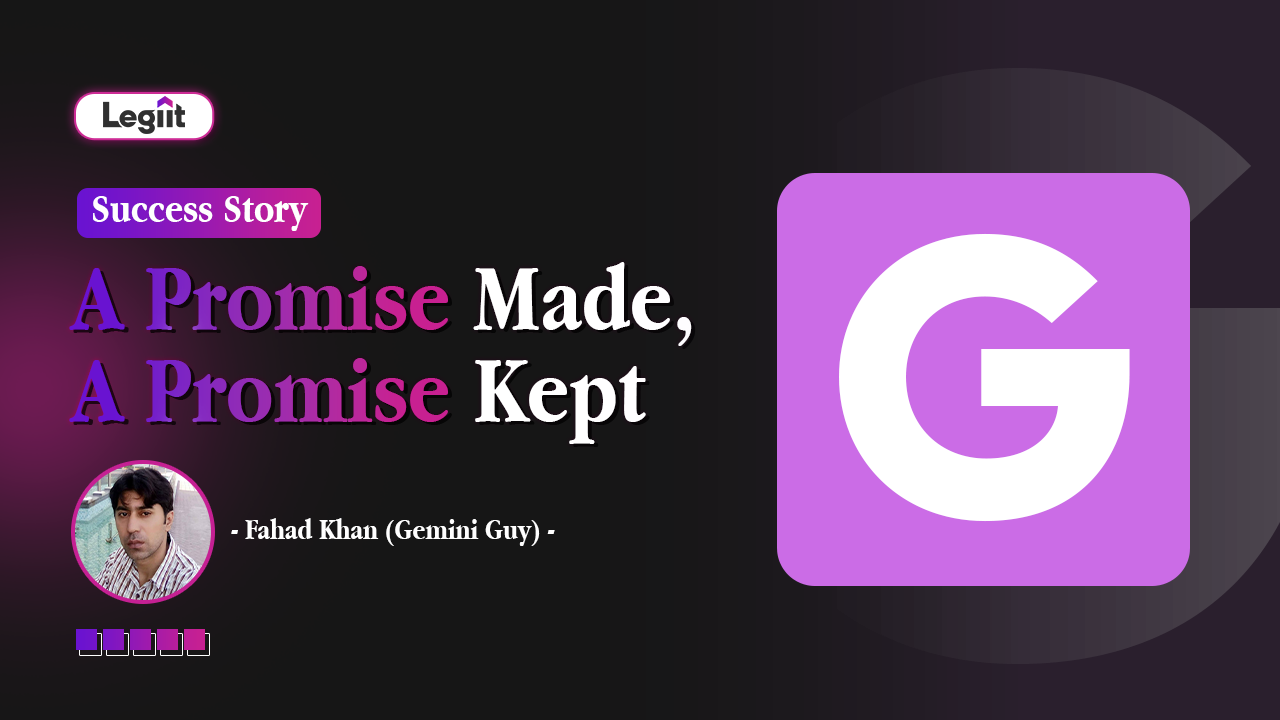“In 2022, I was almost homeless. Orders from Legiit helped me get back on my feet.”
1. Background & Journey
How did you get started in content writing?
I will say thanks to my cousin Ian, who in 2021 introduced me to content writing. I had just finished university, and we were constantly in touch. One day, he called and asked if I’d be open to doing some basic content writing work. Honestly, I had no idea what content writing even meant in that context; I only knew academic writing.
But I said yes.
I started helping him out, made a lot of mistakes along the way, and he kept correcting me patiently. That’s when I began realizing this was content meant for digital marketing. Once I got the hang of it, I kept going and decided to do it part-time under him. Eventually, it grew into a full-time career. And looking back, it all started with that one call.
What made you choose Legiit as your platform of choice?
I’ll say thanks to my cousin Ian again, because when he introduced me to writing, he also introduced me to Legiit. He showed me how the platform worked and how simple it was to use. I remember him telling me, “Look at this, Chris, the owner, is right there on Facebook, talking to freelancers.” That really stuck with me. He even showed me freelancers like Oladejo (seobooster) who had gotten so many orders. We literally sat down and calculated how much they had earned. I was inspired. I wanted to reach that level.
So I signed up for Legiit and created my first service. Honestly, it was terrible. My sales copy wasn’t convincing, and the thumbnail was bad. But I left it there and kept learning. With time, I started to understand what needed to be done to make things better.
Then one day, I saw Chris post on Facebook that any freelancer who posted their service on LinkedIn and tagged him usually got an order. I gave it a try.
That changed everything. Chris placed a $90 order on my service. That was my first real breakthrough on Legiit. It motivated me to keep going.
I kept working, and in 2022, things got tough. I was almost homeless. The place I was staying after university, let’s just say, I was no longer welcome there. I had no money, no backup plan. The orders I got from Chris around that time literally saved me. They helped me pay bills and get back on my feet.
That’s how my journey on Legiit started. And that’s why I’ve never looked back or used any platform other than Legiit.
2. Process & Tools
What’s your typical process when starting a new writing project?
It really depends on what the client wants. If they already have keyword research done, then my job is to take that and map out the what, why, when, and how behind what they’re trying to achieve.
Once I understand that, the first thing I do is come up with a strong headline. That’s where it all starts for me. A headline is like a promise. It tells the reader what they’ll get from the content. If I get the headline right, it inspires the rest of the piece.
From there, I move into the introduction. I try to make sure it’s not just an intro for the sake of it, but something that pulls the reader in and sets the tone for everything that follows. Then I build the rest of the content around that flow, keeping the reader and search engine in mind the entire time.
What tools or software do you use daily, such as for writing, research, or grammar checks?
It depends on the stage of the project, but over time my tool stack has definitely evolved.
Back then, before AI really took over, things were more manual. For grammar, we mostly used Grammarly. For writing, it was just you and Google Docs. Keyword research meant scanning Google manually, looking at what others were writing, or using basic plugins. There wasn’t much else.
Now, things have completely changed. AI is everywhere, and honestly, it has made the process way more efficient. These days, I use tools like Ahrefs and SEMrush for keyword research. For competitor analysis, I sometimes use the Legiit dashboard. It gives a good snapshot of what similar services or content are performing well.
For rewriting or tightening up content, Quillbot still does a good job. And when it comes to writing ideas, outlines, or content drafts, ChatGPT is by far the best tool I’ve used. I also use CopyMagic.ai sometimes for hooks, intros, and refining copy.
So yeah, depending on the task, whether it's research, writing, or polishing, there’s always a tool for it. But the key is knowing when and how to use them without letting them replace your thinking.
Do you have any rituals or habits that help you stay productive? For example, specific hours, coffee routines, or writing music?
Yes, I do. I actually have a few habits that help me stay productive.
First, music. I write best when I’m listening to either country music or rhumba. There’s just something about it that helps me relax and get in the zone. I can go for hours when the right playlist is on. I also enjoy listening to interviews and biography stories, especially about people like Jim Reeves, Hank Williams, Hank Snow, and The Carter Family. Their stories inspire me and sometimes even shape how I approach my writing.
As for timing, I work best early in the morning and late in the evening. Those quiet hours really help me focus without distractions.
How would you describe your writing workspace? What is the most unusual item on your desk?
Well, I wouldn’t say I have anything fancy. My workspace is pretty simple, just my laptop, a family photo, and my graduation photo sitting on the desk. Nothing too serious.
But the most unusual "items" on my desk? That would definitely be my two cats, Eddie and Jessy 😅. They love jumping on the table and sitting right on the keyboard like they own the place 😂. So yeah, if cats count, they’re definitely the weirdest part of my setup.
3. Style & Preferences
How would you describe your writing voice or style in one sentence?
I’d describe my writing style as clear, conversational, and intentional, focused on connecting with real people while still delivering value that drives results.
What types of content do you enjoy writing the most? Examples include blogs, website copy, product descriptions, or scripts.
Well, I have the capacity to draw inspiration and fix pretty much any form of content. But if I had to choose, I’d say I enjoy writing blogs and sales copy the most.
For example, at one point, some of my sales copy on Legiit were among the most persuasive and best-selling. I really enjoy the challenge of writing copy that actually convinces someone to take action.
With blog content, I love the depth and longevity it brings. It’s not just about getting clicks today, it’s about creating something that can keep driving value over time. That’s the kind of content I enjoy crafting.
If your writing style were a person, how would you describe them?
If my writing style were a person, I’d say they’re the type who speaks clearly, but with purpose. They’re laid-back but sharp. The kind of person who knows how to simplify things without dumbing them down. They listen first, then respond in a way that makes you feel like they get you.
They’re also persuasive, but not pushy, more like someone who shows you why something makes sense rather than forcing it on you. They’re curious, adaptable, and always learning, but they’re not fond of showing off.
If you had to focus on one type of writing for an entire year, what would it be and why?
If I had to focus on one type of writing for an entire year, it would be blog writing. There’s something about it that just clicks with me. I enjoy breaking down ideas, building a flow from intro to conclusion, and creating content that stays useful over time.
Blogs give me room to explore, research, and actually say something meaningful, not just rush a quick pitch. Plus, I know the value they bring in digital marketing, especially in SEO. They work long after they're published, and I like that kind of impact. If I had to do just one thing for a whole year, it would be that, hands down.
4. Inspiration & Motivation
What is the strangest or most surprising place where you have found writing inspiration?
As I mentioned earlier, I get most of my inspiration from the kind of music I listen to. Country music has a way of telling stories that stick with you. The way ideas are presented in songs by Jim Reeves, Hank Williams, Don Williams, and especially A.P. Carter it’s more than just music. It’s philosophy. It’s life.
What inspires me most is A.P. Carter’s story. In the early 1920s, he would travel from Maces Spring, Virginia, to Bristol, Tennessee, walking through the mountains, meeting rail workers, listening to the way people spoke and lived. He collected songs, pieces of stories, bits of real life, and turned them into timeless country and gospel music. That process, finding meaning in small, often overlooked moments, that's what moves me.
It’s the same with my writing. I draw inspiration from simple, everyday things. Conversations, music, history, even a phrase in a lyric, can unlock a whole idea for a blog or a piece of copy.
What would be your dream writing gig or niche?
My dream writing gig would be creating content for brands that actually teach and empower people, especially in the digital marketing or SEO space.
Are you currently working on any side writing projects for yourself, such as a blog, book, or zine?
Yes, I am. Through the conservation organization we run here in Nairobi, we’re currently working on a tree museum project. It’s something I’m really passionate about. The idea is to write and collect stories about trees and their relationship with people, culture, and nature over time.
We’re looking at how trees have shaped communities, held spiritual meaning, or even stood as silent witnesses to history. And being part of that process has been deeply fulfilling for me as a writer.
Is there a writer or creator who motivates you to improve your craft?
Yes, definitely. I’ve read a lot of blogs and sales copy from Ahrefs, Copyblogger, and Backlinko. I honestly don’t know the specific writers behind those pieces, but their style really inspires me. The way they simplify complex ideas, keep things practical, and still manage to sound human, that’s the kind of writing I always aim for. Every time I read their work, I feel challenged to level up mine.
5. Achievements & Lessons
What is your proudest writing success so far?
These days, I work as a Community Assistant for Legiit, and one of the things I’m most proud of is the cold and warm outreach emails I write and send myself. They consistently drive results for the company, and knowing that my writing directly contributes to growth is something I value a lot.
Aside from that, I’ve written a few articles over time that are now ranking in the top 5 across Europe and America. Seeing content I created perform that well makes me genuinely proud of how far I’ve come as a writer.
What is one difficult writing lesson you learned that made you a better writer?
One difficult lesson I’ve learned is that writing isn’t about what you want to say; it’s about what the reader needs to hear. Early on, I used to write with my own voice in mind, trying to sound smart or creative, but I slowly realized that if the message isn’t clear or helpful to the reader, it doesn’t matter.
It took time, feedback, and a lot of rewrites to understand that simplicity, clarity, and structure matter more than sounding impressive. That shift in mindset made me a much better writer.
6. Opinions & Writing Philosophy
What is a writing “rule” you like to break, and why?
One writing “rule” I like to break is the idea that every sentence must be perfectly structured and formal. I prefer to write how people actually talk. Sometimes that means starting a sentence with "and" or "but," or using short, punchy lines that break the flow a bit, but feel real.
For me, writing is about connection, not just perfection. If breaking a rule helps the message land better, I’m okay with that.
What content trend or tactic do you think is currently overrated?
One content trend I think is currently overrated is chasing viral content or trending hooks just for clicks. Everyone’s trying to go viral or force attention with flashy headlines and over-the-top intros, but most of it ends up being empty or forgettable.
I think it’s better to focus on content that actually delivers value. Something useful, well-structured, and written with purpose will always last longer than whatever is trending for the week.
If you could rewrite the copy or content for a major brand, which one would it be and what would you change?
Well, I’m actually already writing for one of the biggest brands in the world to me, Legiit, which is where my story began. Being part of the team and contributing through content and outreach means a lot to me.
That said, I wouldn’t mind writing for other major brands like Ahrefs or Backlinko. I really love their writing style. It's clear, practical, and always feels intentional. That’s the kind of content I enjoy creating, and being part of their content team would be something I’d genuinely look forward to.
If you were teaching content writing to a complete beginner, what is the first thing you would tell them?
If I were teaching content writing to a complete beginner, the first thing I’d tell them is this: your main job is to help the client make money. That’s the bottom line. Every piece you write should have that in mind. If your writing doesn’t bring results, the client has no reason to hire you again. It’s that simple.
I’d also tell them to write for both people and search engines. You need to impress real readers by being clear, helpful, and engaging, but at the same time, your content should be optimized enough to rank and get found.
So before thinking about fancy words or complex structure, always ask yourself: Will this help the reader? Will this help the client’s business grow? That’s what good content writing is really about.
7. AI & The Future
Do you see AI as a threat or as an opportunity for freelance writers? Why?
Definitely, it is a threat. It has threatened me as well. There was a point where I genuinely questioned whether clients would still need my services. AI tools were everywhere, and people were using them to generate full articles in seconds.
Honestly, if we were still in the pre-AI era, I believe I’d have made over a hundred thousand dollars just from writing. But things changed. And instead of fighting it, I found a way to adapt.
Over time, I’ve managed to get around it by changing how I work. I now use AI as a support tool, not a replacement. It helps me brainstorm faster, outline better, and even refine my copy when I need a second eye.
At the end of the day, clients still need original thinking, human insight, and content that actually connects with their audience. AI can help with speed, but it still cannot replace voice, strategy, or experience. So yes, it is a threat if you ignore it, but it is also an opportunity if you learn how to work with it. And for me, it has opened up another way to make money, just not the traditional way I had expected.
What is one thing AI still cannot do that human writers can?
One thing AI still cannot do is feel. It can generate words, structure content, and even mimic tone, but it doesn’t have real experiences, emotions, or intuition. As human writers, we understand context, culture, and emotion in ways AI simply can’t.
We know what it feels like to struggle, to win, to doubt, to believe, and we bring that into our writing. That’s what connects with readers. AI can write, but it can’t relate. And that human connection is something machines still can’t replicate.
If you could design your ideal AI-powered writing tool, what would it help you accomplish?
If I could design my ideal AI-powered writing tool, I’d want it to go beyond just generating content. I’d want it to actually understand my writing style, my tone, and the kind of results I aim for, whether it’s persuasion, clarity, or SEO.
It should help me structure articles better, suggest stronger hooks, and give real-time feedback based on my audience or client goals. It should also have built-in keyword analysis, help with headline testing, and maybe even predict how well a piece might perform.
Most importantly, it shouldn’t replace my thinking. It should feel like a smart writing partner that supports my workflow, not one that tries to do the whole job for me.
Closing Quote: "Your job as a writer? Help the client make money. Everything else is extra."













 Download
Download